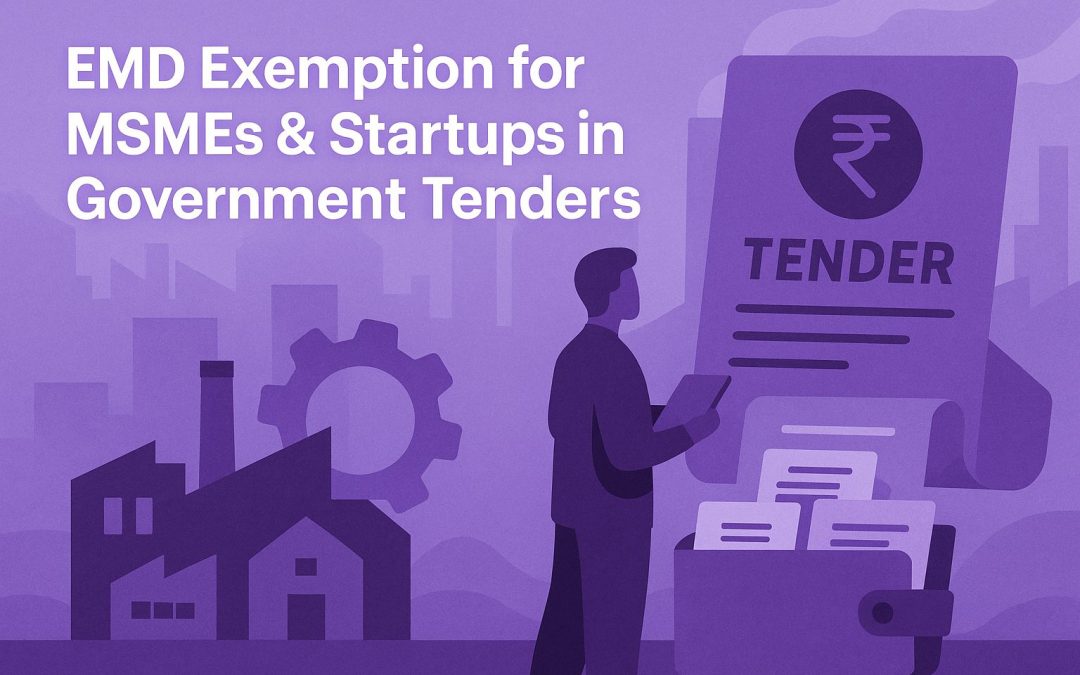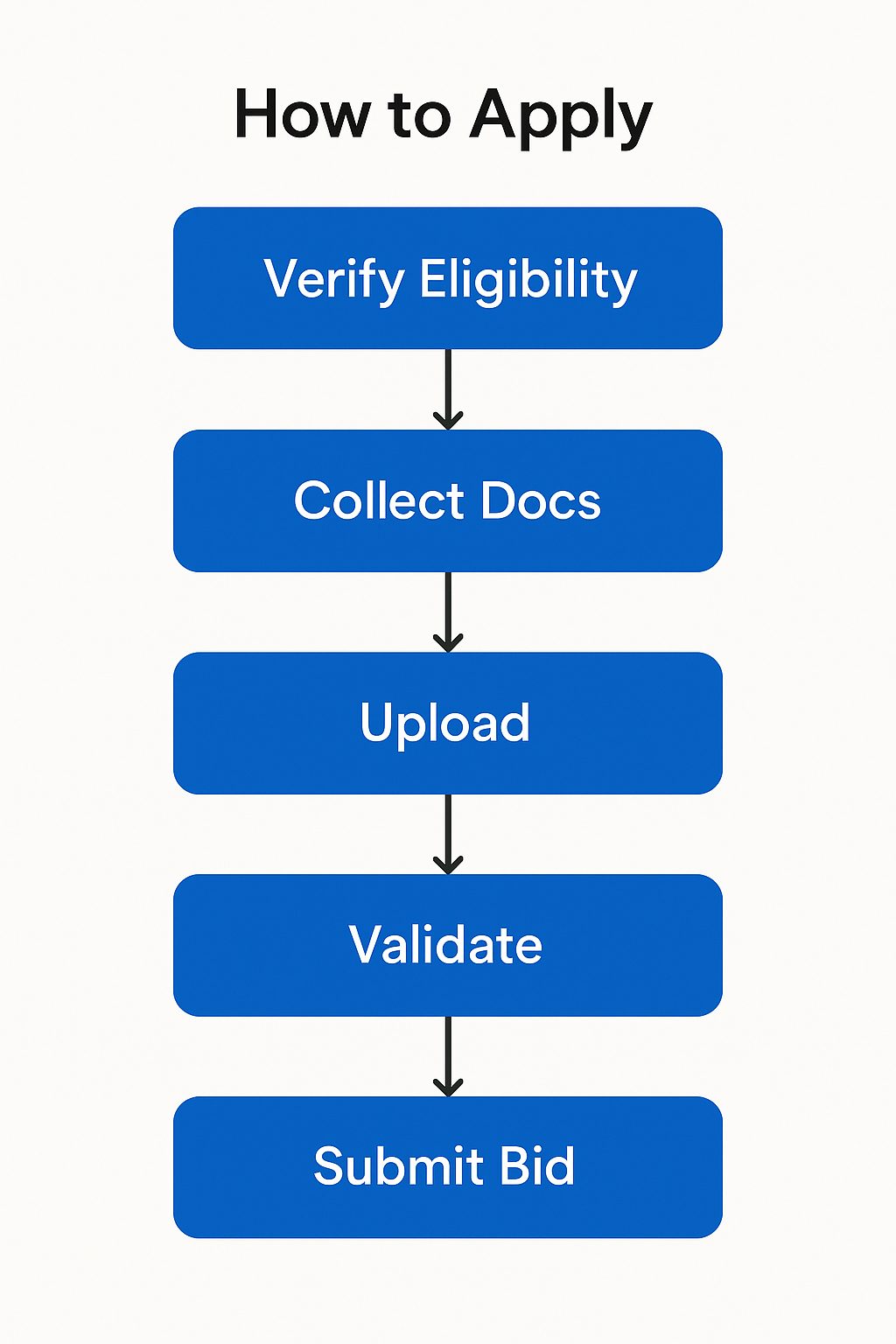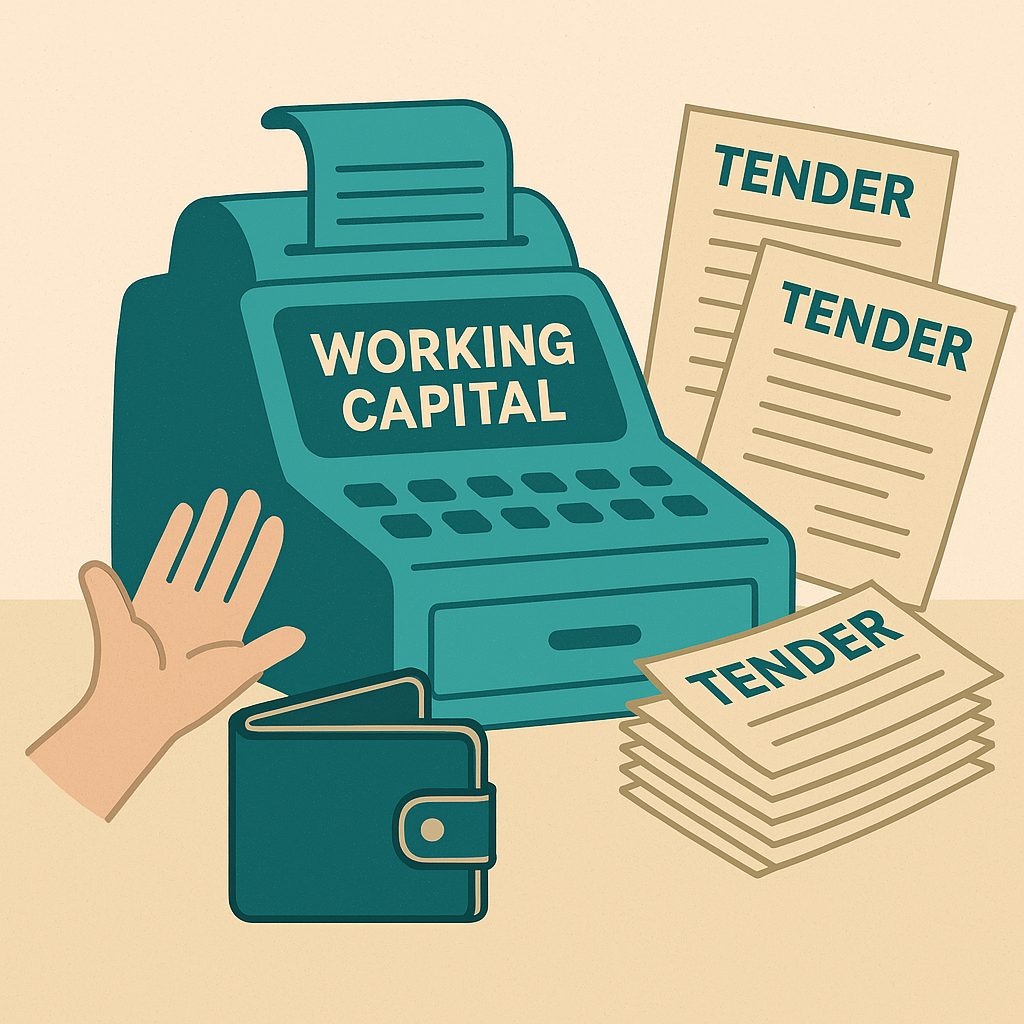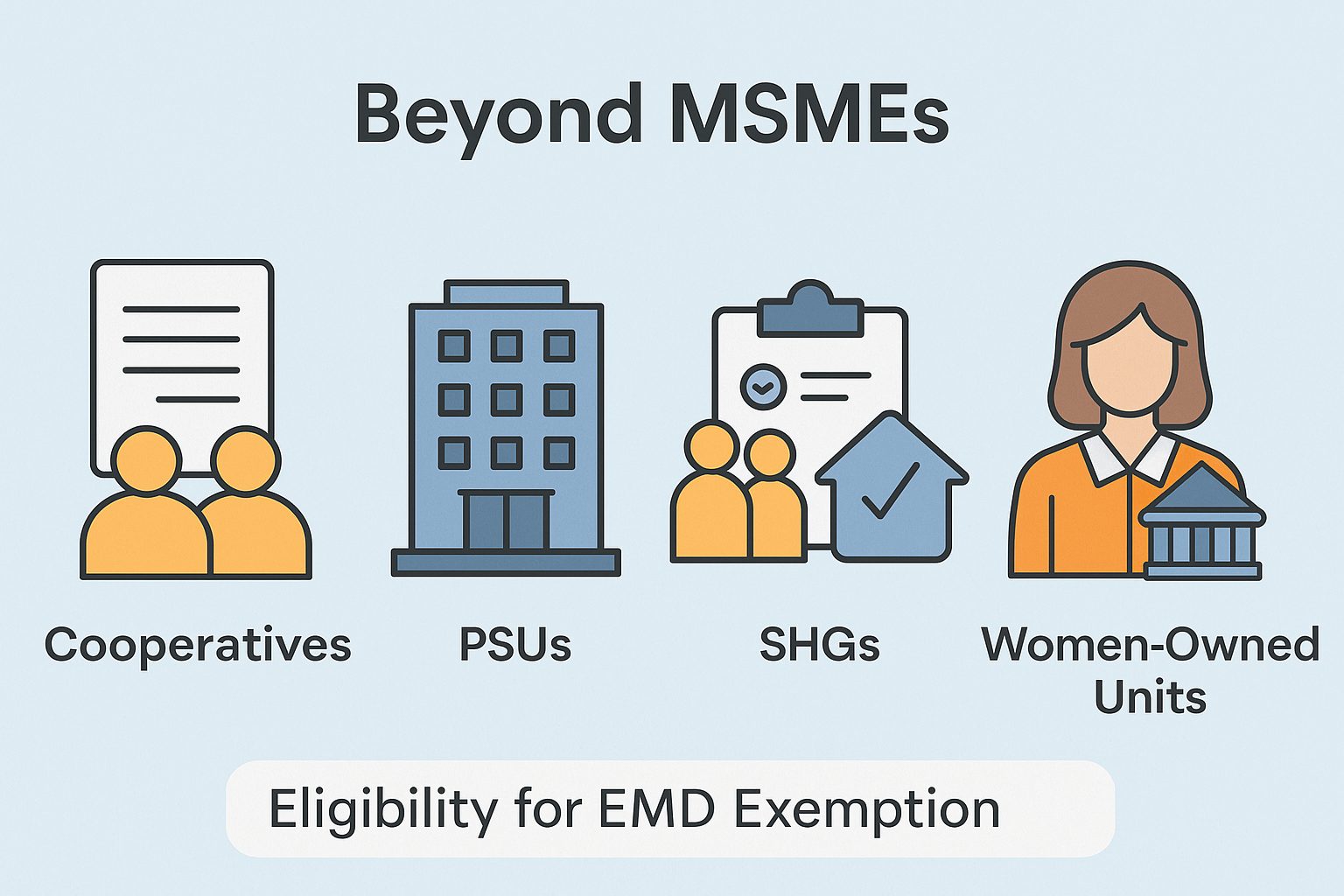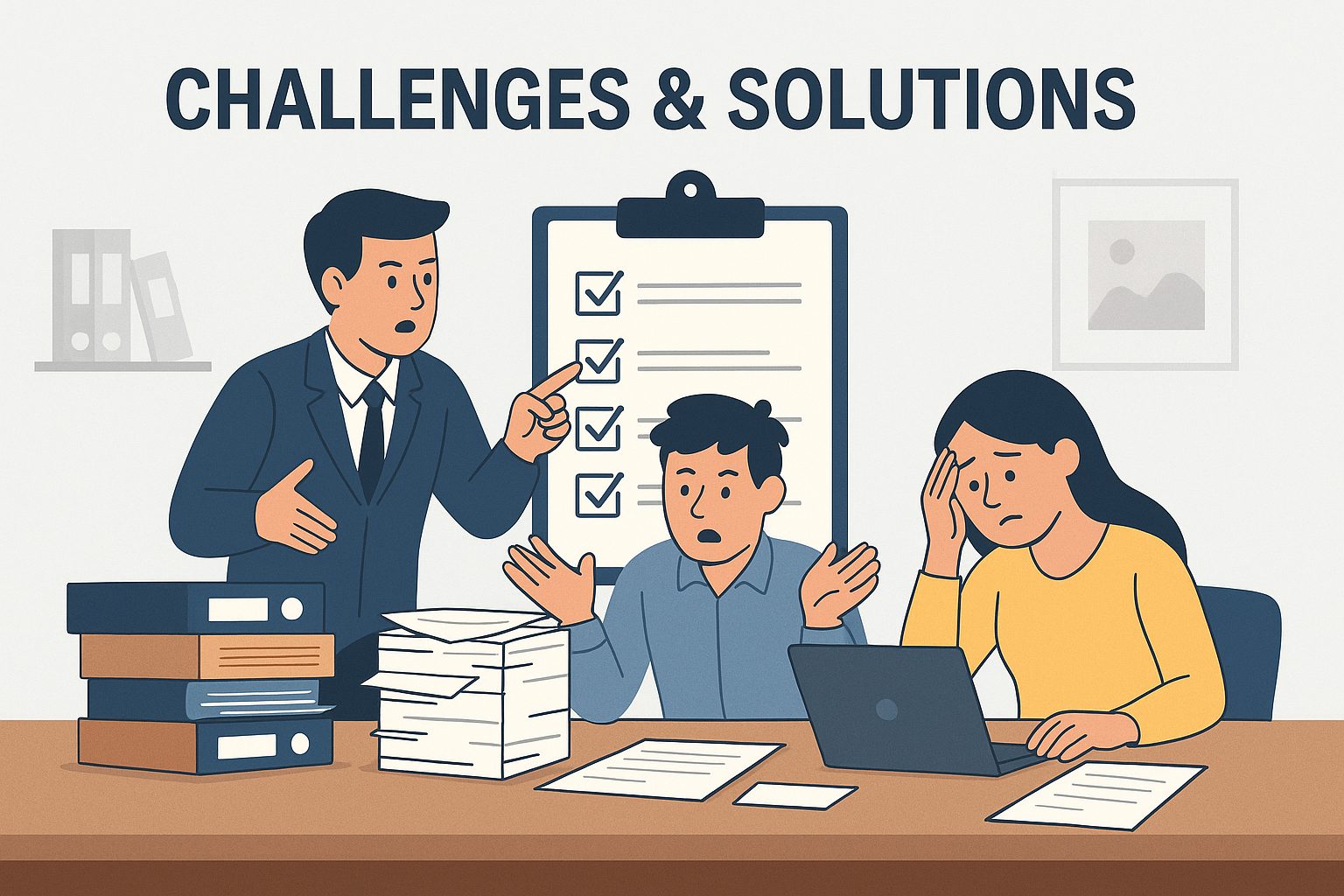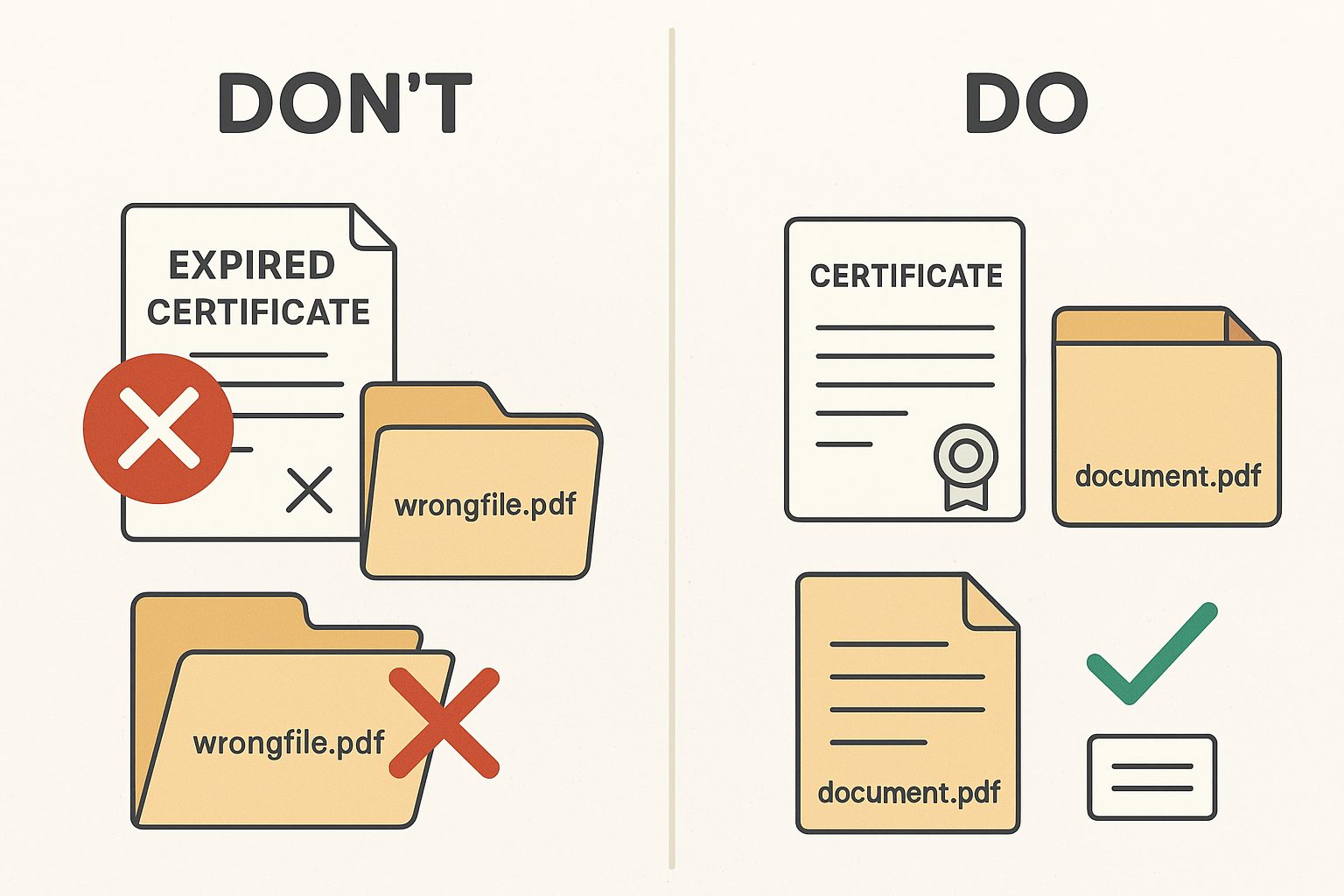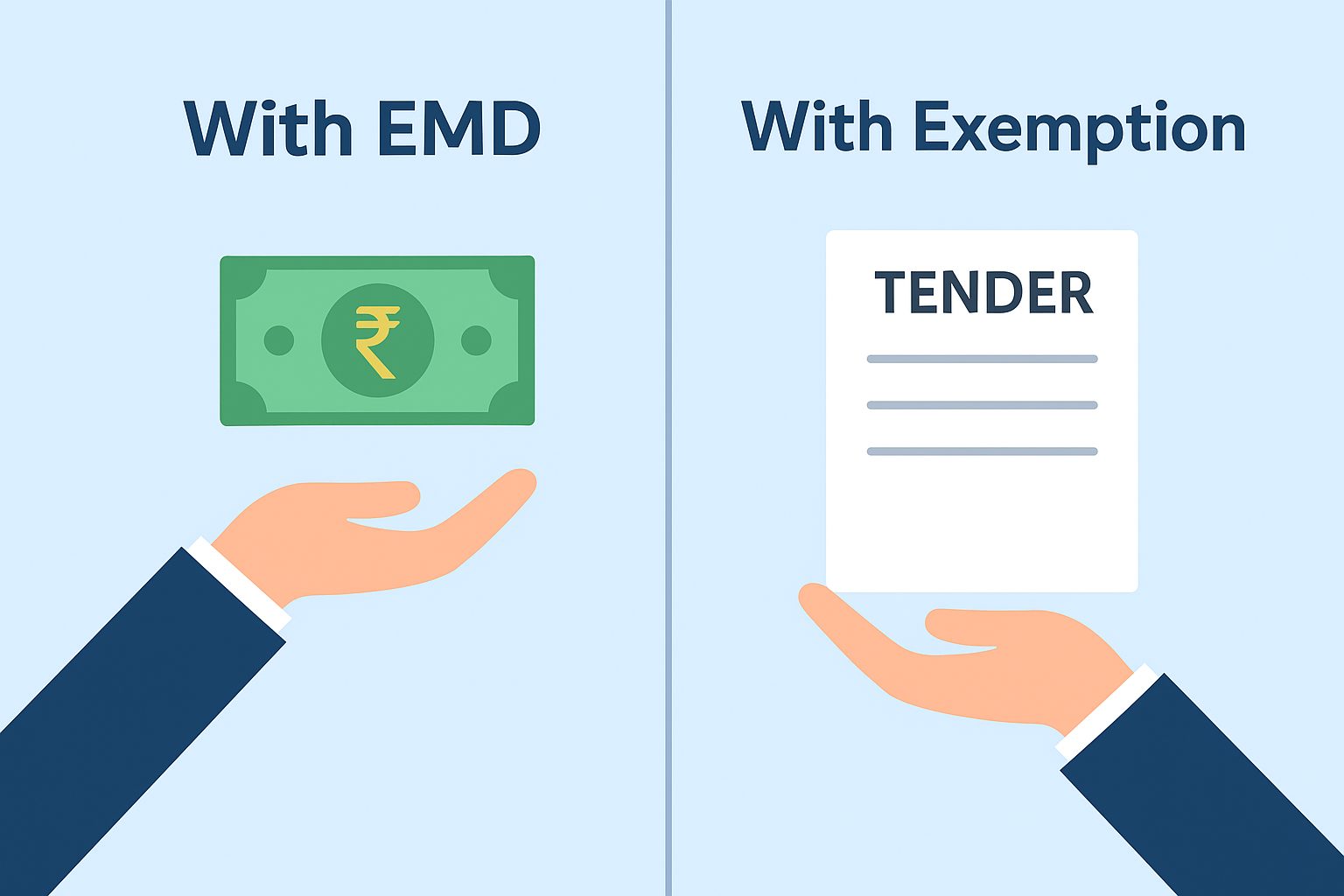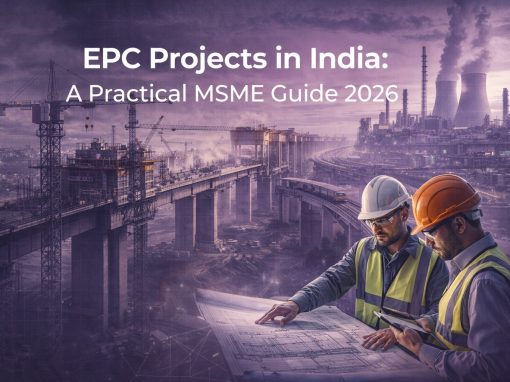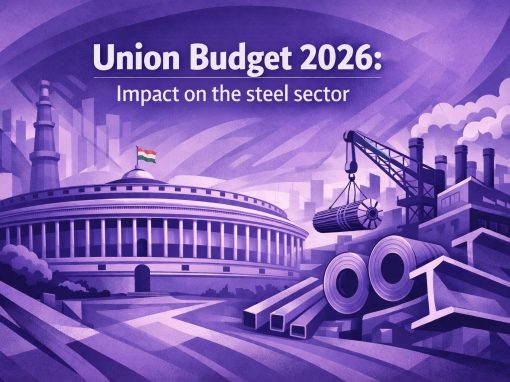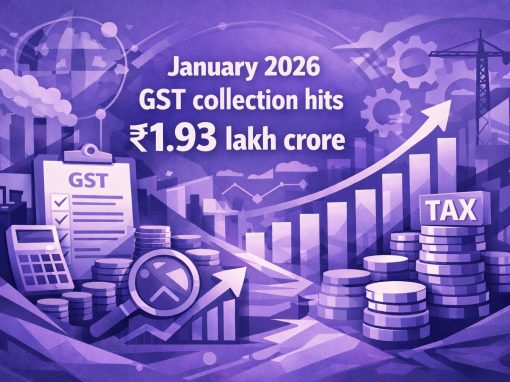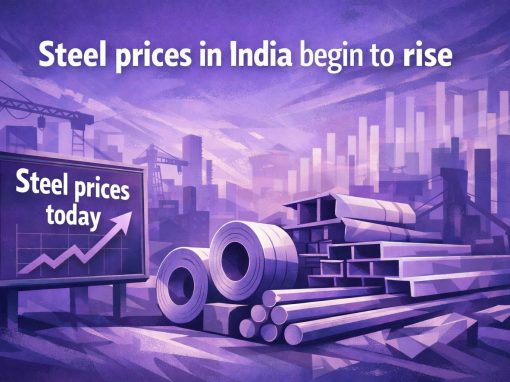Table of Contents
- Introduction
- What is EMD Exemption?
- Who is Eligible for EMD Exemption?
- How to Apply for an EMD Exemption – Step-by-Step
- Why Skipping the EMD Is a Game-Changer for MSMEs & Startups
- Who Else Can Skip the Deposit?
- What the Law Says About EMD Exemption
- What Goes Wrong—and How to Fix It
- Common Mistakes That Cost You the Exemption
- EMD vs EMD Exemption
- Conclusion
Ask any small business owner bidding for a government contract—the Earnest Money Deposit, or EMD, is often the first roadblock. It’s not the paperwork or the process that throws them off. It’s the demand to park ₹2–₹20 lakhs upfront, with no certainty of return. For a growing enterprise, that’s not just money locked away—it’s breathing room lost.
This is exactly why the government introduced EMD exemptions.
If you’re a registered MSME or a recognised startup, you may no longer need to cough up that deposit. It’s a policy designed to ease cash flow stress, encourage broader participation, and give capable but cash-strapped businesses a fair shot.
This guide will walk you through the essentials—who qualifies, how to apply, and what to watch out for—so you can focus less on red tape and more on winning tenders that grow your business.
What is EMD Exemption?
Government tenders usually ask for a security deposit upfront. It’s called an Earnest Money Deposit, or EMD. If you want to bid, you’re expected to pay.
But here’s the thing—small businesses often don’t have spare cash to block just to take part in a tender.
That’s where the EMD exemption comes in. If your business is registered as an MSME, or recognised as a startup, you might not need to pay that deposit at all. You just submit proof, and you’re allowed to bid without putting money on hold.
It’s not a shortcut. It’s a policy to help smaller players get a fair chance without draining their working capital.
Who is Eligible for EMD Exemption?
Before you skip the EMD, you need to be sure you’re actually allowed to. Not every business qualifies. The government has laid out a clear list of who can claim exemption—but the catch is, your documents must be current and match exactly what the tender asks for.
| Eligible Group | What You Need to Show |
| MSMEs | Valid Udyam Registration |
| DPIIT-Recognised Startups | Certificate from Startup India portal |
| NSIC-Registered Units | NSIC certificate with listed product categories |
| KVIC Units | Khadi and Village Industries registration |
| Government-Owned Bodies | Proof of government ownership |
| Central Purchase Bodies | Certificate showing procurement mandate |
| Cooperatives | Society registration document |
| Women-Led Businesses | Ownership proof, as per tender terms |
| Others (Artisans, SHGs, etc.) | Depends on the specific tender |
One important thing—just having a certificate isn’t enough. If your paperwork is expired, mismatched, or missing the right classification, your bid could be rejected without a second look. And once it’s gone, you can’t edit it post-submission.
So, double-check. Even better—get a second pair of eyes on your documents before you upload them.
How to Apply for an EMD Exemption – Step-by-Step
The exemption isn’t automatic—you have to ask for it the right way. Miss a form or upload the wrong certificate and your bid can vanish from the shortlist. Follow these steps and you won’t get tripped up by paperwork.
Confirm you qualify
Pull out your Udyam, NSIC, or Startup India certificate and check two things: the expiry date and the product/service category. If either one doesn’t line up with the tender, renew or amend it first.
Collect every supporting document
Keep a single folder—digital or physical—with scanned originals (PDFs, not photos) of registration certificates, ownership proofs, and any declaration the tender asks for. Label each file clearly; reviewers hate guessing what “Doc3_final_final.pdf” contains.
Read the tender line by line
Don’t skim. Look for phrases like “Bid Security Declaration” or “Format-A for EMD Waiver.” Some portals want a simple upload; others demand a signed affidavit on ₹100 stamp paper. Note every requirement.
Fill the exemption form, if provided
Many e-procurement sites include a checkbox or separate form. Tick it, attach the right files, and triple-check that the upload actually completed—timeouts are common.
Submit early and verify
Aim to upload at least a day before the deadline. Call or email the tender officer, quote your bid number, and confirm they can open your documents. A 30-second call can save a disqualification.
Track status until opening
Keep the portal’s notification emails. If the system flags “document missing,” act immediately. You usually have a short window to cure minor defects before bids are unsealed.
Follow this routine every time and the exemption becomes a routine advantage, not a last-minute scramble.
Why Skipping the EMD Is a Game-Changer for MSMEs & Startups
Cash on hand is the oxygen of a young business. Locking a big chunk of it in an Earnest Money Deposit can suffocate day-to-day operations. An exemption frees that money instantly—and the ripple effects are bigger than most owners expect.
Real-World Payoffs
- Healthier cash flow
Funds stay in your working-capital pool, so you can cover payroll, raw material, or project mobilisation without tapping an overdraft. - More bids, wider reach
No deposit means you can chase multiple tenders at once instead of choosing one “affordable” option and hoping for the best. - Lower borrowing costs
Avoid short-term loans just to park an EMD. Less debt equals fewer interest payments eating into margins. - Stronger negotiating position
With liquidity intact, you can offer better delivery terms or modest price concessions—often the difference between first and second place. - Faster project kickoff
Winning is only half the battle; mobilising fast impresses the client. Free capital lets you order materials and hire crew immediately. - Proof of credibility
Using the exemption signals you’re a recognised MSME or startup with valid certification—an extra stamp of legitimacy in the buyer’s eyes.
These benefits stack up quickly. Keep your capital free, and the tender process turns from a cash-drain into a genuine growth engine.
Who Else Can Skip the Deposit?
The exemption rule isn’t reserved only for micro and small firms. A handful of other players—often overlooked—can shake free of the EMD as well. If you fall into any of these buckets, the same zero-deposit door is open to you.
| Category | Paperwork to Show | Quick Note |
| Public Sector Units (PSUs) | Government ownership certificate or MoU | Applies even when bidding outside home ministry |
| Central / State Departments | Departmental authority letter | Internal bids among departments need no EMD |
| Central Purchase Organisations | Official mandate order | Example: DGS&D, GeM-authorised bodies |
| Khadi & Village Industries (KVIC) | KVIC registration | Limited to products listed in the certificate |
| Registered Cooperatives | Society registration under state law | Works only in states that honour the cooperative |
| Women-Owned Enterprises | Share-holding or director proof | Many ministries give full waiver to encourage inclusion |
| Artisan / Self-Help Groups | Eligibility document as per tender | Often required in handicraft or handloom buys |
Bottom line
If your organisation fits one of these profiles, gather the right proof and tick the exemption box. Plenty of bids go uncontested simply because potential suppliers assume only MSMEs qualify. Don’t leave money—and market share—on the table.
What the Law Says About EMD Exemption
If your exemption ever gets questioned, you should know this: it’s not a favour, it’s your right. Several government rules make it clear that eligible businesses must be allowed to bid without paying EMD. Here’s what actually protects you.
GFR Rule 170 (General Financial Rules, 2017)
This is the main one. It says government buyers can’t demand EMD from registered micro or small enterprises. If your Udyam certificate is valid and covers the goods or services you’re bidding for, you’re in.
MSME Procurement Policy (2012)
Every ministry and PSU has to follow this. It clearly mentions that MSEs must get EMD exemption. It also pushes departments to buy more from small businesses. If your bid is eligible and your paperwork checks out, they’re expected to give you a fair chance.
DPIIT Startup Circulars
If you’re a recognised startup under the Startup India scheme, you qualify too. No EMD, and in many cases, no prior turnover or experience is needed either. But make sure your certificate is active at the time of submission.
NSIC Coverage
Businesses registered with NSIC get a special exemption letter that works like a pass. But here’s the catch: the products or services you’re bidding for must be listed on that certificate. If they’re not, the exemption won’t apply.
State Rules Vary
Some states—like Rajasthan and Gujarat—give EMD waivers to local MSMEs and cooperatives. Others follow the central rulebook. Always double-check the tender’s origin and cross-reference with that state’s procurement policy.
CVC Guidelines
The Central Vigilance Commission has put it in writing: no department should create hurdles for MSMEs or ignore valid exemptions. If you’re eligible and they still deny it, you’re well within your rights to file a complaint.
Bottom line
If you’re covered under any of these rules, stand your ground. The policy is meant to support you—not hold you back. And in most cases, if you present the right papers, the tendering authority has no reason to turn you away.
What Goes Wrong—and How to Fix It
Getting an EMD exemption isn’t hard. But losing it is easier than you think. One missing file, one unchecked box, and your bid’s out before it’s even read. Below are the most common slip-ups businesses make—and how to avoid falling into the same traps.
Too Many Documents, Not Enough Clarity
What happens: You upload everything—Udyam, NSIC, declarations—but the officer can’t figure out which is which.
What to do: Label your files properly. “KVIC_Certificate_2025.pdf” is clear. “Scan2.jpg” is not.
You Didn’t Know You Qualified
What happens: You’ve got the right certificate, but no one told you it can be used for exemption.
What to do: Always check the tender. If you see a clause on bid security, read it closely. And don’t hesitate to pick up the phone and ask.
The Portal Didn’t Accept Your Files
What happens? You upload late, the server hangs, or one file fails without warning.
What to do? Don’t wait till the last hour. Submit a day early. After uploading, take screenshots and call the department to confirm receipt.
Your Registration Was Expired
What happens: You had the document—but it was out of date by a week. Bid rejected.
What to do: Keep your certificates valid. Set reminders. Don’t let a ₹500 renewal cost knock out a ₹5 crore opportunity.
The Rules Weren’t Clear
What happens: The tender says “MSME exempted,” but you’re a DPIIT-recognised startup. You assume that’s enough—it’s not.
What to do: Look for specifics. If in doubt, write to the tender officer. Clarify before you submit, not after.
Someone Tried to Game the System
What happens: You hear about firms using edited certificates or expired documents.
What to do: Don’t follow them. One mistake can get your firm blacklisted across departments. Keep it clean and play the long game.
This section reflects how real businesses operate—not textbook policies, but the reality of missed uploads, delayed renewals, and risky assumptions. If you’ve made one of these mistakes before, you’re not alone. Just don’t repeat it.
Common Mistakes That Cost You the Exemption
Sometimes it’s not the rules or the competition—it’s a tiny oversight that knocks your bid out. These mistakes are more common than you’d think, and they usually happen when there’s a last-minute rush. Here’s what to double-check before you hit “submit.”
Missing Validity Dates
Your certificate might look fine—but if it expired last month, it won’t be accepted. Always confirm the document is valid on the date of tender submission.
Wrong Product Category
You’re bidding for electrical work, but your Udyam certificate only lists food processing. That’s a mismatch—and grounds for rejection.
Uploading in the Wrong Format
Some portals want PDFs only. Others need specific naming formats. If your file doesn’t open or isn’t labelled properly, the reviewer may not even try twice.
Assuming You’re Automatically Covered
Just being an MSME or startup doesn’t mean the exemption applies. Some tenders require a declaration form or a specific format. Miss that one form, and your exemption’s off the table—whether you qualify or not.
Waiting Until the Last Minute
Portals crash. Files fail. The network cuts out. Submitting close to the deadline leaves no room for fixes. You’re better off uploading a day in advance—even if your documents are ready.
Not Reading the Fine Print
Every tender is different. Some accept NSIC, others don’t. Some ask for affidavits, others want notarised letters. Don’t assume—read.
Pro tip: Have a checklist for every tender you apply to. It saves time, cuts errors, and builds a routine that’s hard to mess up.
EMD vs EMD Exemption
Sometimes it’s easier to see the difference when everything’s laid out in one place. The table below keeps the language plain and the comparisons practical—exactly what you’d jot down while deciding whether to pull the trigger on a bid.
| What we’re talking about | When you pay the EMD | When you claim the exemption |
| Cash you part with on Day 1 | A fixed percentage of the project value—often 2-5 %. Could be ₹50 k, could be ₹50 lakh. | ₹0. You keep every rupee in your account. |
| Hit on working capital | Money is parked until bids are opened and refunds clear. That can take weeks. | No parking, no wait. The cash stays in rotation for stock, salaries, or the next tender. |
| How many tenders you can chase at once | Usually one or two—you don’t want too much capital stuck. | As many as your bandwidth allows; cash isn’t limiting the field. |
| Paperwork hassle | Proof of payment (bank guarantee / online challan) plus the usual bid docs. | Your registration certificate (Udyam, NSIC, DPIIT, etc.) and any short declaration the tender asks for. |
| Pain if you lose the bid | Refund comes, but only after the procurement team processes it—which can drag. | Nothing to refund, nothing to track. You move on immediately. |
| Risk you carry up front | Medium to high—you’re wagering real money before knowing the outcome. | Low—you’re only investing time and effort. |
| Who qualifies | Everyone—just pay and play. | Only MSMEs, recognised startups, NSIC units, certain co-ops, PSUs, etc. |
| Rule that backs you | Standard tender clause on “Bid Security / EMD”. | GFR 2017 Rule 170, MSME Procurement Policy 2012, Startup India circulars, NSIC guidelines. |
| Gut-level feeling | “Hope we win, or at least get our money back quick.” | “Let’s bid boldly; all we’re spending is sweat.” |
In plain words
Paying an EMD ties up cash and caps how many tenders you can afford to enter. The exemption flips that script—if you’re eligible, it lets you spread your bets without draining your reserves.
Conclusion
Skipping the EMD isn’t a loophole; it’s a right you’ve earned by getting registered and playing by the rules. Use it. Keep every certificate up to date, label your files clearly, and submit a day early—those three habits alone will rescue more bids than any pricing trick ever will.
With cash freed up, chase two tenders instead of one, stock up on raw material before prices jump, or simply breathe easier knowing payroll is covered. Liquidity equals leverage; don’t hand it over without a fight.
So, before your next bid, ask a simple question: Do I really need to park this money? If the answer is “no,” claim the exemption, bid boldly, and let your working capital do what it was meant to—power growth, not gather dust in a government account.
Looking for the right government tenders for your business?
Tata nexarc helps MSMEs, manufacturers, and service providers find relevant government tenders across India. Discover tenders by location, category, or department, track deadlines, and get notified on time — with complete support to help you apply confidently.
FAQs
Who is eligible for EMD exemption?
How to claim EMD exemption?
How does EMD Exemption benefit MSMEs in government tenders?
Which government tender categories offer EMD exemption for MSMEs?
What are the eligibility criteria for MSMEs to avail of the EMD Exemption?
How can MSMEs apply for EMD Exemption?
What documents are needed for MSME EMD Exemption?
Is there any limit to the EMD exemption for MSMEs?
Can MSMEs apply for EMD Exemption for all tenders?
What happens if an MSME fails to submit the required documents for EMD Exemption?
Is the EMD Exemption for MSMEs applicable for both online and offline tenders?
A product manager with a writer's heart, Anirban leverages his 6 years of experience to empower MSMEs in the business and technology sectors. His time at Tata nexarc honed his skills in crafting informative content tailored to MSME needs. Whether wielding words for business or developing innovative products for both Tata Nexarc and MSMEs, his passion for clear communication and a deep understanding of their challenges shine through.
